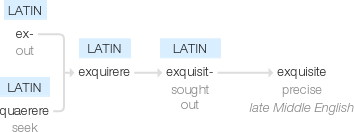Exquisite
late Middle English (in the sense ‘precise’): from Latin exquisit- ‘sought out’, from the verb exquirere, from ex- ‘out’ + quaerere ‘seek’.
wiktionary
From Latin exquīsītus, perfect passive participle of exquīrō(“seek out”).
etymonline
exquisite (adj.)
early 15c., "carefully selected," from Latin exquisitus "choice," literally "carefully sought out," from past participle stem of exquirere "search out thoroughly," from ex "out" (see ex-) + quaerere "to seek" (see query (v.)).
Originally in English of any thing (good or bad, torture and diseases as well as art) brought to a highly wrought condition, sometimes shading into disapproval. The main modern meaning, "of consummate and delightful excellence" is first attested 1579, in Lyly's "Euphues." Related: Exquisitely; exquisiteness. The noun meaning "a dandy, fop" is from 1819. Bailey's Dictionary (1727) has exquisitous "not natural, but procured by art."
